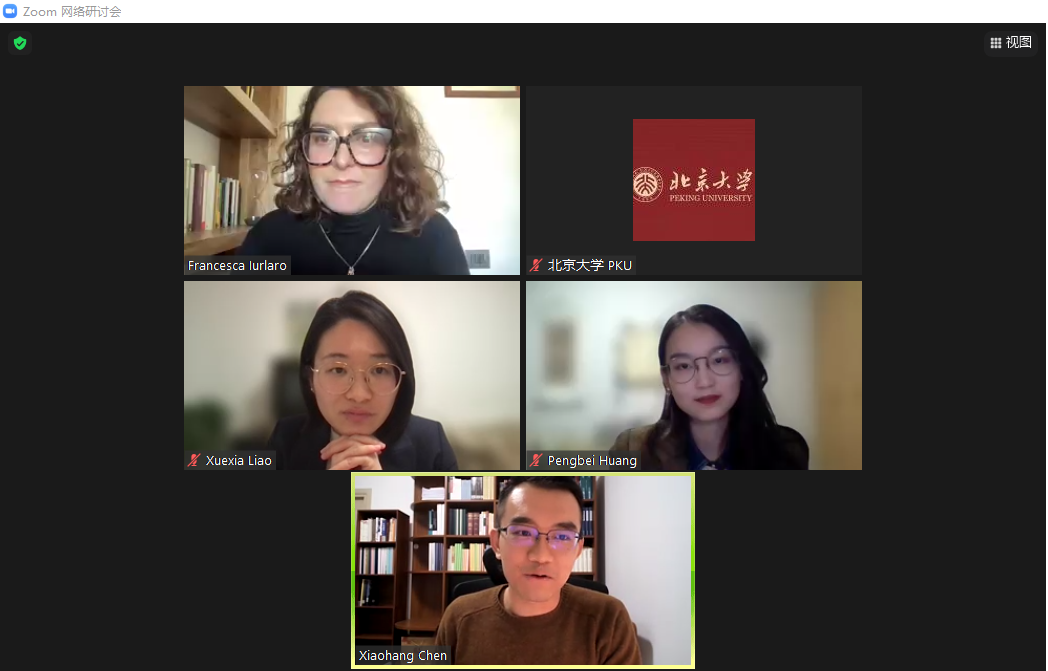The Lecture Series of "The Belt and Road and International Governance"-" The Invention of Customary Law: European Natural Law and the Law of Nations" was Successfully Held
Date:2023-06-07
On the evening of November 23, 2022, the lecture series of "The Belt and Road and International Governance" of Peking University - "The Invention of Customary Law: European Natural Law and the Law of Nations" was successfully held through online. The lecture was delivered by Francesca Iurlaro, a postdoctoral researcher at the Max Planck Institute for Comparative Public Law and International Law, and presided over by Chen Xiaohang, a postdoctoral researcher at Peking University Law School. Liao Xuexia, an assistant professor of Peking University Law School, and Huang Pengbei, a doctoral student of the School, are invited as reviewers. The lecture, which aimed at furthering the in-depth study of theoretical issues of international law at Peking University Law School and deepening the understanding of the history of customary international law among Chinese scholars, was well-received and a great success.

Francesca Iurlaro holds a Juris Doctor degree from the European University Institute (2018). She is a global postdoctoral fellow at New York University (2019-2020) and an Alexander von Humboldt postdoctoral fellow at the Max Planck Institute for Comparative Public Law and International Law (2020-2022). In her book The Invention of customary Law: Natural Law and the Law of Nations, published by Oxford University Press in 2021, she explores how traditional theories from the classical era shaped customary international law. In 2012, she received the Alberico Gentili Prize for her translation of Alberico Gentili's Vergilius Discourse (1603), a legal review of Publius Vergilius Maro's Eclogues.
Before the lecture, Dr. Chen Xiaohang introduced Dr. Iurlaro's research area and her latest works on customary international law to the audience. On behalf of the faculty and students of Peking University Law School, he welcomed and thanked Dr. Iurlaro.
Dr. Iurlaro first clarified the concept of "customary international law" she was discussing. Customary international law in the usual sense is constituted by state practice and opinio juris, and is set forth in the Statute of the International Court of Justice as one of the sources of international law. This lecture, however, will focus not on current customary international law, but on the history of customary international law and how the European legal tradition has shaped the concept of customary international law in international law.
Dr. Iurlaro believed that habits are not spontaneously formed, but rather a carefully constructed invention. The "invention" in this case is not an argument, but a search for evidence of customary international law in classical texts. According to European legal traditions, there are four ways to prove the existence of custom: theology, tradition, rationality, and source of law. Dr. Iurlaro pointed out that customary law has never been universal in the European tradition of natural law and international law. It has always been argued through the theological, literary and philosophical perspectives of European intellectuals. Moreover, custom has a strong conceptual vitality and is therefore often used strategically by jurists. Regarding the coercive effect of customary law, Dr. Iurlaro argued that custom is always insufficient to prove its legitimacy itself and often need to be proven by external factors.
Dr. Huang Pengbei stated that Dr. Iurlaro's book is a good demonstration of how to use the intellectual history as an analytical tool for academic research. She posed three questions to Dr. Iurlaro and Dr. Iurlaro responded.
Liao Xuexia pointed out that Dr. Iurlaro's book is very enlightening because it reveals the tradition of natural law that underlies the concept of customary international law, and the universality of which has never really been challenged. From a positivist perspective, Ms. Liao pointed out that, first of all, certain contemporary rules or concepts of international law do have some traces of natural law. Secondly, a distinction should be made between the formation and identification of customary international law. Finally, the concept of customary international law may seem simple, but the more you think about it, the more questions you will find, and the more elusive the concept becomes.
At the end of the lecture, Dr. Iurlaro had an active exchange with the audience, answering questions such as "the relationship between the law of nations and modern international law", "the relationship between natural jurisprudence and environmental protection", "how to prove the rationality of customary law", etc.
Translated by: Liu Shuichang
Edited by: Zhang Rui



